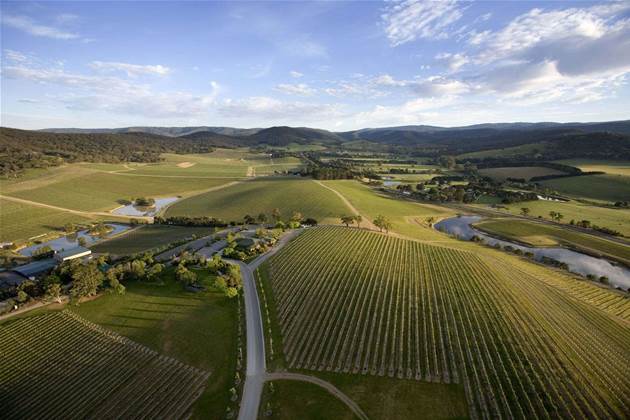This article has been reviewed according to Science X's editorial process and policies. Editors have highlighted the following attributes while ensuring the content's credibility:
fact-checked
trusted source
proofread
Why De Bortoli Wines built 'Facebook for growers'
As a producer of perishable goods, having a bank of trucks lined up at the warehouse at the end of the day waiting to deliver product was a situation De Bortoli Wines wanted desperately to avoid.

Enter VineAccess - or what the Australian wine producer dubs 'Facebook for growers'.
The web-based platform puts the onus of grape testing on the growers, and gives them the ability to record their own data on things like the quality of the fruit and how fast it is ripening.
Previously, a small De Bortoli team was responsible for testing hundreds of vineyards throughout all the stages of the grape maturity cycle.
Unsurprisingly, this resulted in a bottleneck to the delivery process.
It also meant that the risk of grapes over-ripening or being hit by disease was greater during peak times, when there weren't enough staff to check all vineyards early enough in the cycle.
"Grapes harvested too early, too late or showing any disease can heavily impact the quality of the wine produced, so the maturity and quality of the grapes needs to be monitored on an ongoing basis. Grapes can also only be harvested after any agricultural sprays have had sufficient time to degrade and break down," IT manager Bill Robertson said.
"VineAccess allows our growers to log their spray diaries online so we can keep track of this activity and effectively trace the spray usage on all of our fruit.
"Having this visibility of grape maturity also allows us to predict optimum harvest times and emerging disease risks, and take appropriate actions much earlier than we otherwise would be able to."
But simply allowing growers to test and record their own data wouldn't work on its own. De Bortoli also needed to modify its ERP platform to synchronise grower data with its own data (the company does the final testing of a vineyard before harvesting.)
The wine producer, led by Robertson, also decided to integrate the two platforms with its harvest advice and delivery scheduling systems.
This enables De Bortoli to use the grower testing data to flag when it needs to conduct final testing before harvest. The combined VineAccess and ERP data can also be used to calculate the optimum picking time.
Prior to the implementation of the new approach, growers were turning up to the depot with grape deliveries as and when they wanted, facing the prospect of queueing for hours in mid-summer heat.
Now, the integration with the delivery scheduling systems means De Bortoli can schedule a 15-minute window for growers to bring their grapes to its depot.
"This allows us ample time to test the fruit, check compliance and weigh the truck in - removing pressure on the weighbridge staff and reducing the load on many of these bottlenecks," Robertson said.
"For our suppliers it also allows the trucks to be back in service and getting onto the next load - hopefully a more efficient use of their time and resources than waiting in our delivery queue.
"A new complaint we now have is that drivers now no longer have time to catch up on industry gossip while waiting with a cup of tea."
Each individual delivery is sent a barcoded, PDF delivery form generated by the system, which is presented at the depot, cutting down on time and allowing for better supply chain tracking.
"When entering the depot, casual drivers were not always easily able to tell the weighbridge operators which vineyard block and/or variety the load was related to," Robertson said.
"Our barcoded grape delivery advice alleviates the risk of grapes being put through the wrong crusher, avoiding potential compliance and quality issues."
The new approach has meant De Bortoli can now optimise the grape intake period - from nine to 12 weeks between January and June - with normal operations now five days a week with one shift, compared to seven days a week with multiple shifts in the past.
Robertson and De Bortoli Wines are finalists in the Retail category of the iTnews Benchmark Awards. The winners will be announced at a gala dinner at Melbourne's Grand Hyatt on February 17.



















